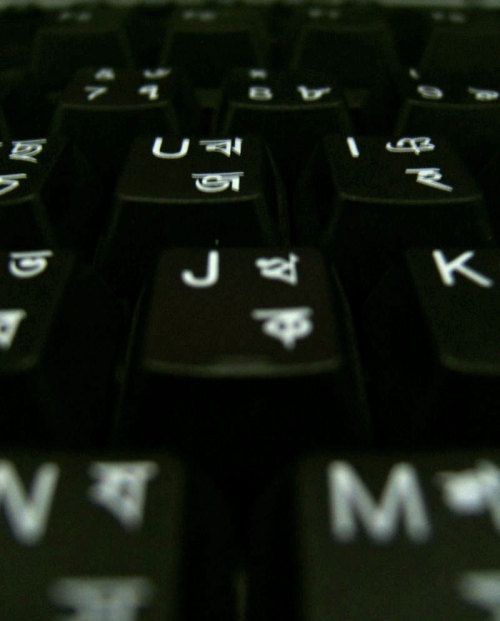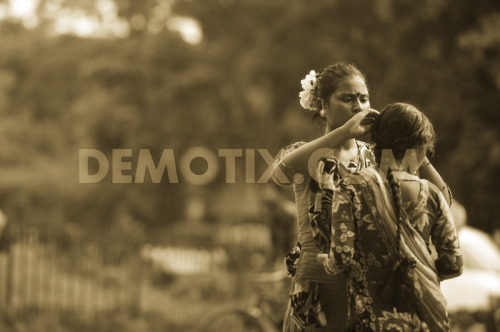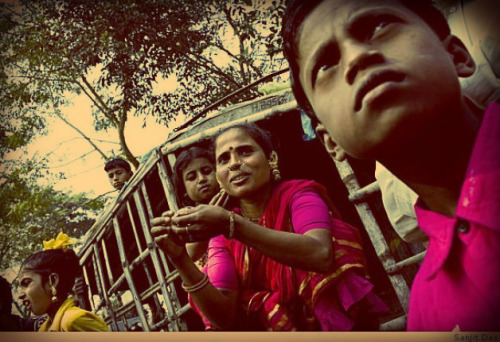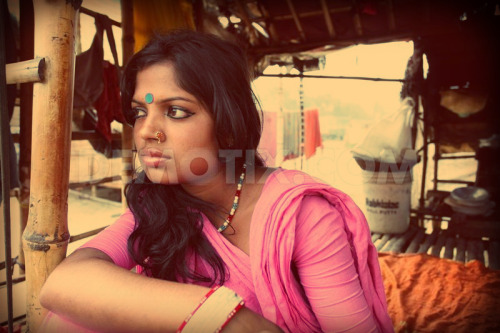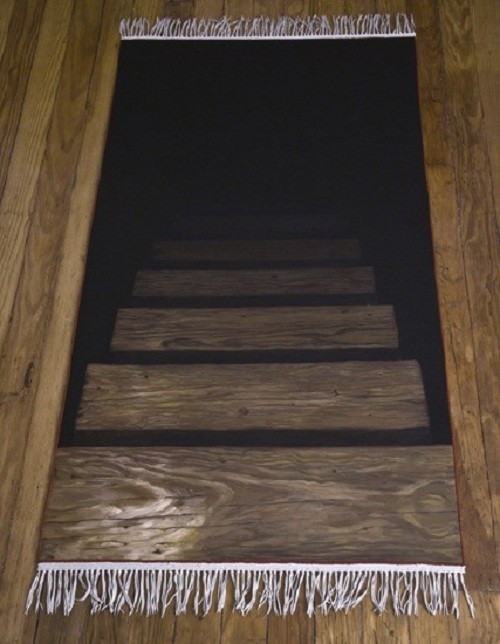#bidesh
Amar baccha! My children, listen, for I have a story to share with you.
In the beginning there was the Kund, the deep wellspring from where the first Ohm of the Universe flowed. Soon other sounds and utterances flowed through, forming brooks of syllables, joined into streams of words, joined into rivers of sentences, joined into seas of stories, joined into oceans of truth.
And each sound and syllable and word, each sentence and story and truth, each little drop carried with it the Power of Creation and Destruction, the Power of Language: together like the ebbs and flows of tidal waves, like drought and floods, like sunshine and rain.
Creation comes from Destruction comes from Creation.
And this Power, the Power of Language, this exists for all those who speak, listen, write, read. For all those that carry Language in their heads and in their hearts. For it is Language that is your birthright and it is Language that is your responsibility.
And Language is not to be restricted, to be hoarded as though it is some precious and rare gold or silver. No, Language is to be shared by all, for it is everyone’s birthright, and everyone’s responsibility, to partake in the ebbs and flows of Creation and Destruction.
You are not the Master of Language, much like you are not the Master of Water or Air. You, all of you, are in Service to Language, much like you are in Service to Water or Air - Powers that create you, Powers that sustain you, Powers that destroy you.
There are some of you that will be entrusted to ensure the safety, sanctity, sanctuary of Language. You will be known as the Compassionate Ones, the Shafiqs, caretakers and custodians of Language and all those that wield it. It is your responsibility to care for the hearts and heads of those you serve, to ensure that their needs and desires are met, that they remain safe and protected and well. It is your responsibility to ensure that Language is shared freely, that Language is served for the greater good, that all hold access to Language and that your Language does not die before it is time.
And oh how its time will threaten to come! For there will be forces that claim to be Masters of Earth and Fire, claim their right to ravage your lands and control your people with ever-changing boundaries and restrictions. Forces that claim to be Masters of Water and Air and destroy all which you build in symbiosis to create that which dominates. Forces that claim to be Masters of Language, their own Language, while denigrating yours as lesser-than, impure, powerless.
And then there will be forces of your own. You claiming responsibility as privilege and using your custodianship as cruelty. You forgetting your own birthright and believing those that say your power can only be accessed by a select few through specific means foreign to you. You letting go of your Language, that which gives you Life, and forgetting all the syllables and stories and truths that it carries.
Destruction comes from Creation comes from Destruction.
The Power will still manifest, still create and destroy, even without your wielding of Language, even without those who speak and listen and write and read. It is Power that has existed before there was Humanity and will exist after there is Humanity, for it is Power that has created the Universe and will destroy the Universe.
Learn to approach Language with respect and responsibility, and you will gain strength, fortitude, prosperity, livelihood. But treat Language as though it is something you can control, restrict, deny, destroy, and you will find that it will control, restrict, deny, and destroy you.
And if you ever find that you are close to the brink of no return, return to the Waters: the oceans, the seas, the rivers, the streams, the brooks. Return to the wellspring, to the Kund, and call out for a new Ohm.
Remember this, baccha, for forgetting is the first step to Destruction without Creation.
[[source:Belinda Meggit
So thepostmodernpottercompendium is hosting this really interesting series on the origins of magic which is now becoming an interesting story in progress. I have been meaning to write this story for a long time, ever since I found this picture in researching the bede, or gypsy boat people of Bangladesh:she’s one of them. I knew she was the face of thedainee that mysteriously guides the Bideshis as soon as I saw her picture, and now I want to write her story.
The line about the kund and the first ohm is from a piece by Minal Hajratwala, about being a kinky queer femme Indian woman. In the piece she plays a lot with language and draws the connection between “cunt” and “kund” - as in “kundalini”. The name of the piece escapes me right now but it was performed in this year’s Yoni Ki Baat in SF.]]
Post link
“I don’t think that would be a good idea, Sabila.”
“Areh jaan! You want her to grow up without any idea about her background, her history, who she is?”
“Backgrounds and history - that’s for the past! You have to see the future. See what is best for her now.”
"What is so wrong about speaking to her in our language? Teaching her what we learnt? You think all those years at the Cadet College were a waste?”
“Even the Cadet College is no more, Sabila. It was all destroyed in the war - there’s nothing left!”
“The war for our culture and language! And we won!”
"With everything destroyed - all our infrastructure, our leaders, our intellectuals, dead and gone! Our kind, gone!”
"They cannot be all gone. I know it. I know our kind are still around. It’s not like all Bangladeshis were killed off in the war.”
"Our kind? Our kind either escapedor died! No two ways about it! And let me tell you - those that escaped? I know for sure that they don’t follow the old ways anymore.”
“‘Old ways’? OLD WAYS!? You think all those years of jadu that we learnt are “old ways”?! Cheech! Maybe maa was right…”
"Right about what?”
“Right about you thinking we are just stupid casi. No respect for our heritage. Maybe I should have listened to her.”
"Sabila! Don’t be ridiculous. I have a lot of respect for our heritage. I just don’t think that trying to teach it to Ayesha now would be useful for her. I mean - firstly, who is she going to speak Bangla to?”
“There are other Bangalis here too, you know. You moved here specifically because of them. And I’m sure there’s at least one jadukara in there.”
"Ya, they move here, with their big names and big jobs and big degrees, and what happens? They become cooks! or taxi drivers!”
"Is there something wrong with being a cook or a taxi driver?”
“NO! It’s just…they also learnt so much about their culture and what not, but look, the Bilatis, they do not care. I don’t want our Ayesha to suffer because the Bilatis don’t care.”
“Then why not just move back to Bidesh then?”
“Did you forget already? Everything is destroyed. What can we return to? We would suffer. Ayesha would suffer. You want Ayesha to suffer? I got us here for a good life, you know. Lucky for us she is born here, makes things so much easier I think.”
"So you want her to grow up like a Bilati? No concept of her culture at all, is it? Pagol na ki tui?”
"No no no! Sabila, shuno na? It’s not that I want her to not know where she comes from, at all. Na na. I’m just saying, I don’t think it’s a good idea for her to learn Bangla right now.”
"Then how is she supposed to learn our literature, our stories, our songs? How is she supposed to be a good jadukara?”
"There are magical people here in Britain you know. With that one school…Hogwarts, I think? Some top people from there. It’s not like she will never know how to perform jadu.”
“But she won’t know how to do it like us! How is she supposed to cast a good tantramantra if she can’t even speak Bangla properly? How is she supposed to make good potions if she doesn’t even know the names of the ingredients? How, Faizal, how?”
"She will learn Bilati magic! It’s not hard, look - Lumos - see, there is light.”
"Where did you get that wand from?”
“Oh, one of my friends took me to Diagon Alley the other day. Said all the Bilati magicians have wands. We should get one for Ayesha. Oh, and you too.”
“And why should I have to learn Bilati wand magic? We didn’t need this faltu wand business back in Bidesh!”
“Things are different, Sabila. When in Rome, do as the Romans do, ha na?”
"Oh, so if the Romans all jump off a bridge I have to jump also? Chagol!”
"If I am a chagol then you are a goru - so stubborn.”
"DON’T YOU DARE FAIZAL…”
“Hey hey, I am only kidding, areh. Sabila. Look. I’m not banning Bangla from the house. You want to tell her all our stories and literature and what not, you can. What I am saying is, for her sake, I think we should talk to her in English. And teach her English. Do everything in English.”
"And what happens if I put ek Bangla khota in my sentence? What, it will be all ulta palta hai hai ki hoisei?”
"One or two things, ok. But we have to be careful not to mix up so much. One of my cousins, he is a child psychologist, he says that sometimes the children get confused when they hear more than one language, so they keep quiet. They don’t know how to say anything! But if you pick one, then they learn easier.”
"Your cousin, ah? You Shafiqs, you think you know everything.”
"You wanted to be a Shafiq. Couldn’t stop talking about it even before we got married. Thought we had the good life.”
"I didn’t think having the good life means we have to forget ourselves!”
“We don’t have to forget ANYTHING! We can teach her Bangla later, when she’s older and can master one language. Then she won’t be so confused. But Sabila, look - even if she knows Bangla now, who is she going to practice with?”
“Us…”
“Yeah, and that’s it. You think the neighbours can talk to her in Bangla? Her school teachers? Her classmates? They will only make fun of her.”
"Oh, you think Bangla is funny?”
"No, I think the Bilatis are stupid. But I don’t want their stupidity to cause my children trouble. So we have to adapt.”
“Then what about the jadu?”
"Again, where is she supposed to cast tantramantra or find ayurveda ingredients? Where is she going to find the sahitya books we loved so much? For all we know, it’s probably banned here. One strange word and whoosh - off to Azkaban. The Bilati Ministry did ban flying carpets after all.”
"Faizal, I don’t think the Bilatis will send a child to Azkaban.”
"Oh you don’t know. I’ve heard them punishing children very strictly for doing magic in front of Muggles. Just small things, but oh - Statute of Secrecy!”
“Listen to you! You sound like a Bilati already. ‘Muggle’, what a lousy word. As if they are like a pig or something.”
“That’s how the Bilatis see jadunai, really.”
"WHAT? Are the Bilatis really that backwards? Are you sure you want to raise Ayesha in this place?”
"It’s better than our other option, Sabila. At least here she still gets a chance to learn some jadu, even if it’s different than ours. Maybe she can be a magical scientist and put our jadu and their magic together. I don’t know. But back in Bidesh? She will be nothing. Worse than here.”
"I’m still not sure about this.”
“I know you’re scared, Sabila. You loved sahitya so much. I do too. That is why I loved you! Your passion for the language, so evident in your eyes! But it will have to wait, jaan…just wait a few years. Just wait till she is old enough to be able to appreciate it. You try to tell her now, she will forget.”
"And you’re sure talking to her in English only and giving her only English books is okay.”
“It will prepare her for a bright future. We don’t want her to suffer because she doesn’t know the language. People are already going to criticise her because she is not White like the Bilatis. Even though she is born and raised here. The less hurdles she has to jump through, the better.”
“So we have to hide ourselves because the Bilatis are close-minded?”
“I know, I hate it too. But that is how the world works. Not everyone can fight fight fight. That is why we did not go to the war. Sometimes we have to take care of ourselves first.”
“Spoken like a true Bilati.”
“I’m just saying the facts.”
“sigh…”
“Sabila, I promise you, if she wants to learn Bangla, once she’s ready, you can teach her. You don’t have to hide anything. You can tell her about the old days if you want. All I’m asking is, just do it in English. Until she’s old enough. OK?”
"…ok, jaan. I hope you’re right.”
[[source:Rajiv Ashrafi
OOPS WRONG BLOG LET ME TRY THIS INSTEAD
written to commemorate International Mother Language Day, which in turn commemorates the Bengali Language Movement. It’s a pretty huge deal in Bangladesh. thanks to serkestic for the reminder!
a lot of this is based on a true story: I was primarily raised in English because my family figured I would not have any avenues to practice Bangla while being raised in Malaysia. English is my first and primary language. I speak rather broken Bengali and can’t read the language. This project is as much about me trying to reclaim what I’ve lost as it is me having fun with fandom.]]
Post link
[[entire discussion OOC]]
the thing that fucks me up most with harry potter headcanon as a mixed chicana w/ native+”mestiza” roots is that “purebloods” already wiped us the fuck out. you can play harry potter and pureblood as a metaphor for british classism all you want but don’t tell me that the Salem Witches academy wasn’t built on the site of native americans lands, don’t tell me that european wizards and witches didn’t come to the americas and slaughter those who weren’t secretive about their magic, who didn’t have muggles, don’t tell me they didn’t slaughter us/the american magical peoples, they didn’t convert as many of our ancestors to god-fearing religions as possible because then our brothers and sisters would fear the witches and force magic back into secrecy and out of the hands of our kings and queens, our chiefs, our sages, shamans, healers, don’t tell me that spanish and british and french wizards didn’t come to the americas and round us up, ripping the magic users away from their families to be schooled in proper wand-using magics instead of wandless or wordless or magic by other means in boarding schools which humiliated us, which stole our native tongues and obliterated our heritage and our native power and then mocked us for when we continued to strive to fit our own cultures into their tiny tiny molds
don’t tell me that abuelas and abuelos don’t whisper to their grandchildren the old spells they still know, that in secret, we still cling to magic that they could never understand
voldemort as a singular villain isn’t so scary when your people were raped, enslaved, and slaughtered across two continents for hundreds of years
imagine the bitter laughter of the elderly curandera — ay, now they’re worried about who is being killed
imagine the blood your headcanon is built upon
This is where I’m going with my Shafiq Twenty-Eight series, though it’s kind of a class divide on multiple angles. On the one hand, you have the general population of Bidesh (magical Bengal/Bangladesh area) who think the Bilatis (Brits) are stupid for trying to impose some sort of separation between magical and muggle and thinking that magic is so clearcut.
But on the other hand, you have the upper-class Shafiqs (who in my fic are more like feudal landlord types that may be loosely related to each other) who subtly look down on the commoners and disregard them as farmers or pheasants (though that’s not all the common folk do). I don’t think their disdain is malicious per se - ignorant condescending benevolence, perhaps. They didn’t get around to building a school and codified magical system until relatively recently, and most of that is because they notice that the commoners are itching for a revolt and the school is their means to quell the masses (especially if they offer scholarships to the high-achieving poor kids, like Ayesha’s mother Sabila).
The heart of jadu in Bidesh is in their culture and literature and language, which permeates the country and is the main reason for Bangladesh’s liberation and existence (hence the problematic nature of trying to impose the Statute on them). However, a lot of the practical skills of jadu,knowing how to harness that culture and language into magic, comes from the bede, the boat people, the villagers. They haven’t forgotten.
And in some way the Shafiqs, like Begum Indrajala, know this. Their job as a Shafiq is actually to be a trustee to this magical knowledge, to ensure that the culture stays intact and the heart still keeps beating. But somewhere along the way they got power-hungry, they got patronizing, they though protecting their people meant treating them as little children. They chased glory and forgot greatness.
Even as they fight off the British and Pakistani colonialists (magical or otherwise) for trying to suppress their culture, they are doing damage to themselves.
I was just on the phone with my mum, who didn’t quite get what I was trying to explore with the class divides in my story. She thought that Sabila being a bedewas nonsensical - surely she’s a lot more sophisticated than that (well, it was mostly because Sabila is inspired by my mum somewhat and she thought I was calling her uneducated). She also questioned my use of casi for the commoners because that’s what you call really backwards village uneducated folk. But that’s kind of the point - they’re actually the most educated out of everyone, but the Shafiqs in power don’t really respect that because the commoner education doesn’t look like the Shafiq education - it doesn’t look like their private tutors, it doesn’t look like Hogwarts or Durmstrang, it doesn’t look like the Cadet College. You want to be seen as worthy? Follow the structure. None of this loosey goosey business.
I’m also trying to figure out how this fits with the Trixie/1920s Bengali Harlem storyline. Her mother is from Louisiana Voodoo stock, so she would have learnt a lot of old magic that way, and her dad is a Shafiq, but pre-Cadet College. I’m thinking of how in Malaysia you’d have a lot of people that have hereditary title-names like Raja or Puteri or Syed and usually that hints to some royal lineage but they’re so far removed that functionally they’re like regular folk. Considering the way family trees work in Bangladesh I figure that Trixie’s dad is more of a distant relative than a direct descendent, having some cousin or other study at The Big Magic Schools, relatively middle-class by Bangladeshi standards - I mean, he’s an international merchant, he has a fair amount of money, but he hasn’t completely forsaken his roots.
I know stopdropandbeauty was planning on exploring issues of colonization and imperialism and native genocide in potential HP headcanon/fic, and I feel like some of the other headcanon blogs have touched on that one way or another. HP Headcanon Tumblrs seem to be a trend now, so maybe someone will pipe up and write something along those lines!
(also I wonder if part of the original meta is running under the assumption that only White people can be from Pureblood families, at least in JKR’s stated canon. I pounced on Shafiq when I saw it in the Sacred 28 list because that’s my last name, it’s a name rooted in a rich cultural history that is not White European, it’s real. The only other real-sounding last name on there is Abbott though I couldn’t be wrong. And there’s also Shacklebolt, and the one canon character we meet from that line is Black.)
“Sabilabeta, please - please come to your senses!”
Mahmubah watched her daughter storm off in a huff, refusing to look back at her. Was this really her daughter? The one who thought her family was the universe, who would giggle as her mother and aunties braided her everlong hair, who would listen intently to stories of the dainee and annoyed her older cousins by being the favourite student of their jadukara elder (“she’s not even supposed to be here!”) and dreamed of mastering the difficult and arcane mysteries that were shopnojyoti?
Would her daughter really dare be so biadab to her elders, so stubborn and petulant? Well, Sabila was always stubborn, but normally she was stubborn for a good reason - like wanting to learn more and more, or wanting to help with the fishing and cooking.
But wanting to run off and marry a Shafiq?That was not a good reason.
“Maa! I have come to my senses! He is a good man, and we will have a good life. You can have a good life too, can’t you see?”
“A GOOD LIFE?! Is your life not good enough already, being with your family, living a simple village life?”
No, that goddamned Indrajala Cadet College corrupted her, taught her that her people’s ways were faltu and messy and old-fashioned, taught her that the only good way to do jadu was to be like the Bilatis: quick fixes and short sentences.
Taught her that the only good jadukara were the Shafiqs, because they owned land, and her people deserved to be ruled over because they were transient and spent more time in the rivers.
Casi, those Shafiqs called them. Peasant. Country bumpkin. Gravel and poison in their mouths.
Sabila looked back at her mother, not quite knowing which age to be: her body feeling out twenty, her mind fresh out of school and primed for a new adventure, her eyes with the same earnest twinkling from infanthood. Did her mother want her to be an independent adult or did she still see her as the child with the braids?
“Look, Maa! We live hand to mouth, hoping Allah will bless us with fish and rice, having to move around all the time because the cyclones and floods take everything away! Not even the strongest jadu of our kind can conquer Mother Nature! We are being destroyed, Maa - but this is our chance to survive.”
“IT IS THAT MAN’S FAMILY THAT IS DESTROYING US!” If Mahmubah was not too tired she would have slapped Sabila. “They pulled us from the rivers, our soul and blood, and made us come to land. They took away our connection to the water - that is why the cyclones and floods wash everything away. They have stopped paying respect to the water; instead they seek dominionandcontrol, as though they are Gods. As though they are the dainee! They and their Godforsaken school, wanting to control jadu, no respect for where it came from - the WATER!”
“You sent me to that school!” yelled Sabila. When she was not even ten, a couple of staff members from the relatively-new Begum Indrajala Jadukara Cadet College had visited their bank of the river to look for students. They were impressed enough by Sabila’s talents and sheer enthusiasm to offer her a full scholarship.
Sabila thrived in that school: her love of learning flourished as she was exposed to a wealth of subjects and skills, most of which she would never have imagined back in the river. She picked up TantramantraandAyurveda with ease, having had a lot of practice back home and relished the jadunai subjects like Mathematics and Art and English since they were so newandfresh to her.
(To her puzzlement the subject of shopnojyoti was barely mentioned anywhere in her studies - if it did it was only referenced as a lost, possibly mythical art. Sabila did spend some time trying to investigate what her teachers really knew about shopnojyoti, but after one too many deadends she dropped this line of inquiry and focused on regular schoolwork.)
Her absolute favourite school subject was Sahitya, Literature - a curious blend of jaduandjadunai. The works and writers she studied had achieved acclaim amongst the jadunai, even outside Bidesh, winning awards with strange names like No-Bell. Yet these works were so clearly written by jadukara, so infused were they with magic and power - the heart of jadu beating through the mastery of the Bengali language.
It was through Sahitya that Sabila lost her heart: to Faizal, a young man maybe a year or two older than her, as energetic and macho and boisterous as any other male his age - except he was a Shafiq. One of the Zamindars, the landowners. Probably a heir to the school. He wasn’t as passionate about learning as Sabila, indeed even with his family status he didn’t stand out much, but he was funny and had big ambitions and treated Sabila like a queen. Faizal watched Sabila recite some Chakravarti poetry at a joint recital, one of the few times the boys’ and girls’ sections came together, and fell in love with her beauty and depth of passion.
Their depth of passion sparked a love affair that had to be kept relatively secret during their school years - can’t destroy your dignityandhonour, you know - but after years of passing poetry back and forth and cheering on sports games and late-night walks with mishti and moonlight, Faizal proposed marriage.
“You are my sultana,” he said. “Let me give you the good life, be part of the Shafiqs, never a care or worry in the world. Be a real sultana.”
Sabila had been surrounded by Shafiqs - most of the school consisted of them or their peers, landowner families with privilege. There was even the odd Bilati or two, the occasional Cinadeshi and Japani, and a few who were like her - poor river people on scholarships. The Shafiq students didn’t talk to her much, but Sabila admired them all the same: their grace, dignity, ease with power. Their elegance and beauty. Their chatter about those strange exotic cities they would go to on holiday - London and New York, Alexandria and Istanbul. They had everything they ever wanted. They never needed to struggle.
Sabila remembered years of barely being able to eat when cyclones and floods would wreck their makeshift towns (a fairly common occurrence). She remembered the clothes getting threadbare, there was only so much that repair spells could do. She remembered late nights staring out onto the rivers, wondering why their boats would never travel further into the oceans, is that not what boats were for?
What was her life for, if not to explore with elegance and grow with grace? How could her mother not see how much better her life would be married to a Shafiq? Did her mother notwant her to have a good life?
“We sent you to school because we wanted you to have a chance at a good life.” Thought so! Just as Sabila was about to jump in:
“Butbeta, being a Shafiq? They are different from us. They don’t respect us. They are of the land; we are of the water. Let those of the land return to the land, and those of the water return to the water.”
“Didn’t you say all jadukara come from the water? That includes the Shafiqs. That includes Faizal.”
“THE SHAFIQS HAVE BETRAYED THE WATER! They have forgotten about the ways of the water! Did you not listen to me, baccha?! They turned their backs on the water to rule the land! They turned their backs on us, on you!”
“I AM NOT A BACCHA!”
Sabila was furious. Her mother saw her not just as a child, but a baby. Who was she to preach about respect when she wouldn’t respect her own daughter?
“Faizal did not choose to be a Shafiq,” said Sabila after a (slightly futile) attempt to calm down. “But he chose me. He could have chosen anybody, even another Shafiq or a Bilati girl, but he chose me. He wants me to be his sultana, Maa. He wants me to have the good life.”
“Does he want us to have the good life?” asked Mahmubah, losing patience with her daughter’s insolence. “You don’t just marry one person, you marry into their family, their community. Is he going to provide for us, or is he just going to rule over us and make us suffer so that we can provide for your sultanalife?”
“He will not make you suffer - I will not let him make you suffer.” Sabila was losing patience with her mother’s obstinance. “Please, Maa. Faizal is a good man. Just at least meet him. I promise, he’s not like all the other Shafiqs who don’t care. He cares. He cares about me and he will care about you.”
Sabila sat by her mother’s feet. She knew her mother had reason to doubt; she did lose her father, after all, to mysterious circumstances that left her mother barely able to take care of her even with support from extended family. But Faizal was different. She’s sure of it. If only her mother would give her a chance…
“Okay. I will meet him. But I cannot promise that I will approve. I need to make sure he is good enough for my daughter.”
Sabila kissed her mother’s feet in gratitude. Believe me, Maa - we will not let you down.
[[picture sources: articles on demotix (1,2) and sfgate about the Bede people-nomadic river-gypsies of Bangladesh that practice magic. (I’m aware that the term “gypsy” is a slur against Romani people; however, almost all my sources about the Bede people (inc from Bangladesh) use “river-gypsy” as a descriptor and I’m not sure what other terms are favoured by that community since they’re not English-speaking.
My computer can’t really deal with most graphics software and the originals of the demotic photos are about 55GBP each, so please excuse the massive watermark.
Sabila is the name of the woman whose photo I used to talk about a Bangladeshi magic wedding. Mahmubah and Faizal are named after my parents.]]
Post link
See, I don’t understand what the British wizarding world’s problem is with flying carpets. The Ministry of Magic over there banned them because they were a ‘Muggle object’ - because brooms don’t exist in the Muggle world at all, nooooooo. And they’re expecting the rest of the world to follow suit because they’re Brits and therefore know better?
Hell the sort of brooms you see in England - whether as transport or as cleaning tool - aren’t even that common elsewhere. This, for example, is a more common type of 'broom’ in Asia, particularly where my parents are from:

Yes, a bundle of sticks. Sure, you could magically reinforce them so that they don’t break, but the idea of sitting on a bunch of splinters doesn’t appeal to me.
I did try out flying during my brief time at Hogwarts. It’s…okay, but probably overrated. The broomsticks aren’t particularly comfortable, it takes an incredible amount of balance, and you’re basically trying to keep yourself stable on a tiny tiny amount of space. And you can’t really carry anything that you’re not wearing (though I have been told of broomsticks that come with luggage baskets charmed to carry any amount of items).
Flying carpets though? They’re wide, they’re soft, they’re gentle. You can bring multiple people and a whole host of objects. Many of them do double duty too - that one in the picture? You put it over any surface and it gives you instant access to hidden levels and rooms - if there’s nothing there, or if you’re a Muggle or jadunai, all you see is a pretty design. Sometimes you just don’t have time to hunt for trapdoors.
One of my uncles designs flying carpets. A lot of the ones his company makes are pretty standard, like how there are regular family cars. But they’re also doing a lot of groundbreaking work with carpets, openly borrowing from the jadunai, knowing that a lot of technological innovation on the jadunai side was inspired by us anyway so why restrict ourselves? It’s just symbiosis, says he. I was kind of young when I met him and his carpet company for the first time, visiting family back in Bidesh, and the carpets were the main thing I remember about that entire trip.
He had all sorts of fun stuff: carpets with built-in compasses (some of those have compasses that point to the Kaabah so they can double as Muslim prayer mats), this prototype where the carpet itself was a GPS system, ones with voice command, I think they were working on one that purifies the air or does something to reduce carbon footprints. All very imaginative innovative stuff.
And what do the Brits, the Bilatis do? BAN THEM. Probably because they feel threatened that some backwards region of the world can be more magically advanced than they are. 'Muggle objects’, pah.
There’s a lot about Bideshi magic that I’m still struggling to wrap my head around, so much that I don’t even know. But flying carpets? Here is where we win.
[[not sure where the original carpet picture is from. picture source for the lidi broom.]]
Post link


